Fleurs du Mal Magazine


Or see the index
![]()
Čisti zov divljine
Ponekad imam osjećaj da sam se odavno izgubio
na ovom svijetu i da je sve krivo postavljeno:
i imena gradova, i imena ulica, i imena ljudi,
znakovi na cesti, krsni listovi i boje na zastavama.
Da smo krive lekcije učili u udžbenicima,
i profesori da su trebali biti đaci
i učiti od nas koji smo bili djeca,
a mi da smo trebali ostati onakvi
nezainteresirani za strane svijeta,
statističke podatke o ekonomskom rastu
i kada je koja bitka vođena.
Čini mi se da bi bili pametniji
s onim osmjehom dječaka koji se
nemilosrdno ceri pred kartom Svijeta
smiještajući Afriku gdje bi trebala biti
Amerika, i Europu tamo gdje je Azija.
I mudriji da je bio naš bijeg sa školskog sata,
od dosadnih formula iz fizike i kemije.
Jer – tako je to ponekad u mojoj glavi –
čini mi se kad ljudi ništa ne bi znali
o kemijskim spojevima i zakonima fizike,
još uvijek bi živjeli u špilji
i igrali se na mame i tate.
I da bi bez Dnevnika, Interneta i dnevnog tiska
više poznavali jedni druge. I kako teku suze,
i kako grmi smijeh. I srce kako se kadikad steže
mimo svih zakona, pred stvarima o kojima ljudi
najčešće i ne razmišljaju, a o kojima u udžbeniku
nije pisalo ništa.
Ponekad stvarno imam osjećaj da sam se izgubio.
I što je lijevo, učini mi se da bi trebalo biti desno,
i što je desno, da bi trebalo biti lijevo,
i ono što je gore, da bi trebalo biti dolje,
i obratno. I sve bi tako ispremještao.
Jer čini mi se ponekad, da se ljudi
i vole i mrze po inerciji i navici.
I da čine sve samo zato jer im je netko rekao
da je dobro da to čine baš tako
kako su ih naučili da čine,
a zapravo nije, jer bi moglo i drukčije.
I svašta se meni tako čini, i pričinja,
ponekad i predskazuje, pa stvarno bude onako
kao u tom predskazanju, a ne onako kako su nam rekli.
Čudne me misli spopadaju. Što sam stariji, sve to više.
I ponekad mi bude pravo žao što nikada nisam živio u špilji,
bez frižidera, mikrovalne i daljinskog upravljača.
Zamisli da svako jutro iznova moraš kresati kamen o kamen
da bi zapalio vatru, ganjati divlju svinju ili loviti ribu?
Kakve bi ti se onda misli vrzmale po glavi, i bi li tvoje ruke
imale isti osjećaj za stvari?
Dobro! – Priznajem, bilo bi to naporno. Ovako je mnogo lakše.
No, što je s osjećajem za stvari? Je li i naša glad ista
kao i ona prva? I ona vatra, kao ova mikrovalna? Grokće li ova
pitoma svinja kao i ona divlja? Ili smo se svi izgubili
među svim tim zemljama, jezicima, kulturama, tehničkim
i mentalnim pomagalima? I je li ono bilo divlje samo zato
što su nas razmazili, ili smo mi divlji kojima nije bila dovoljna
riba za ručak, pa smo sagradili brod, pa tvornicu, pa…
nacrtali Europu, Ameriku, Aziju…
– Da mi je ući u tvoju glavu, mislim da bi se osjećala ko Alisa
u zemlji čudesa! – tako mi reče jednom sestra.
I nije bila daleko!
Na ovoj planeti čudesa, da te nema,
Ljubavi moja, ne znam kud bih krenuo.
Niti što bih uopće radio?
O tome razmišljam dok gledam tvoje lice.
O kojem mi nitko nije rekao ništa,
a na kojem je zapisano ama baš sve
što je važno.
Čisti zov divljine.
Vinko Kalinić
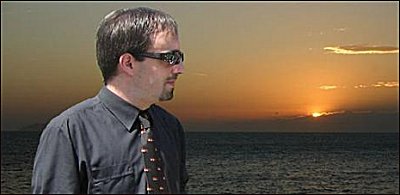
Pure call of the wilderness
Some-time I have a feeling that I’ve lost myself a long time ago
on this world and that everything is being wrongly set:
towns names, streets names and peoples names,
signs on the roads, birth certificates and the colours of flags.
That we learned wrong subjects from the textbooks,
and that professors had to be the students
and learn from us who were the children,
and that we should have stayed in
disinterested states for the sides of the world,
for statistical data on economic growth
and when was what battle fought.
It seems to me that we would have been smarter
with that smile of the boy who
relentlessly grins in front of a world map
placing Africa where should be
America, and Europe where Asia is.
And also, if the wagging school was wiser,
than boring formulas of Physics and Chemistry.
Whereas – it’s like that sometimes in my head –
it seems to me when people wouldn’t know
anything about chemical compounds and the laws of physics,
they would still be living in the cave
and they would still be playing mums and dads.
And that without the TV news, internet and daily newspapers
they would better get to know each other. And how tears drop,
and how laughter thunder. And also how the heart sometimes squirm
past all laws, in front of things people
most often don’t think, things that
never existed in the textbooks.
Sometimes I really feel that I’ve lost myself.
And what is left, it seems to me that should be right,
and what is right, that it should be left,
and what is up, that should be down,
and vice versa. And so, I would mix up all of that.
Because it seems to me sometimes, that people
love and hate each other by inertia and habit.
And that they do everything just because someone told them
it was good to do just that
as they taught them to do,
but actually is not, because it could be otherwise.
And everything methinks so, and vice,
and sometimes predicts, and really it is exactly
as in that prophecy, and not the way they told us.
Strange thoughts seize upon me. As I got older even more.
And sometimes I’d be really sorry that I have never lived in a cave,
without refrigerator, microwave and remote control.
Imagine that every morning you have to strike the stones together
to light a fire, chase the wild boar or catch a fish?
What thoughts would you then be having in your head, and whether your hands
would have the same sense for things?
Well, OK! – I admit, it would be hard. Thus it is much easier.
But what about the sense of things? Is our hunger the same
as it was the hunger before? And that fire, is it the same as this microwave one?
Does the domestic pig grunt the same as the wild one? Or we all have got lost
among all these countries, languages, cultures, technical
and mental aid tools? And whether that was wild just because
we were spoiled, and we are wild, we who didn’t have enough
just fish for lunch, so we built a ship and factory, and so…
we just drew Europe, America, Asia…
– If I could get into your head, I think I would have felt like Alice
in Wonderland! – my sister once said to me.
And she wasn’t too far from the truth!
On this planet of wonders, if you were not here,
My love, I do not know where I would go.
Nor what would I do, anyway?
I think about it when I look at your face.
Face nobody told me anything about,
and on which is written absolutely everything
that is important.
Pure call of the wilderness
Vinko Kalinić
Translation by Darko Kotevski, Melbourne, Australia
Vinko Kalinić was born 1974 in Split, Croatia. He is a writer, journalist and human rights activist. He lives on the island of Vis. He is the editor of the internet portal My island of Vis, which is dedicated to life on the island and the Mediterranean culture. Also on facebook Vinko Kalinić daily writes his poetic diary, which tracks more than 2 300 fans.

Vinko Kalinić poetry
kempis.nl poetry magazine
More in: Archive K-L, Kalinić, Vinko
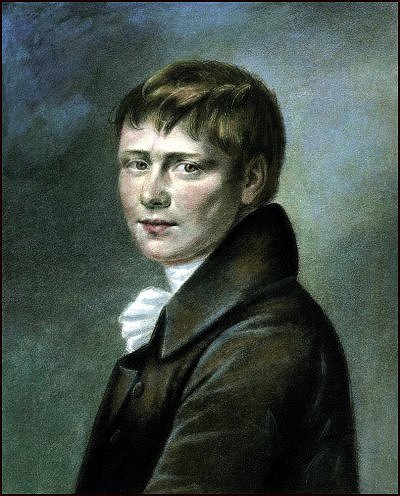
Heinrich von Kleist
(1777-1811)
Der Engel am Grabe des Herrn
Als still und kalt mit sieben Todeswunden
Der Herr in seinem Grabe lag; das Grab
Als sollt’ es zehn lebend’ge Riesen fesseln,
In eine Felskluft schmetternd eingehauen:
Gewälzet mit der Männer Kraft, verschloß
Ein Sandstein, der Bestechung taub, die Türe;
Rings war des Landvogts Siegel aufgedrückt:
Es hätte der Gedanke selber nicht
Der Höhle unbemerkt entschlüpfen können;
Und gleichwohl noch, als ob zu fürchten sei,
Es könn’ auch der Granitblock sich bekehren,
Ging eine Schar von Hütern auf und ab
Und starrte nach des Siegels Bildern hin.
Da kamen bei des Morgens Strahl,
Des ew’gen Glaubens voll, die drei Marien her,
Zu sehn, ob Jesus noch darinnen sei;
Denn er, versprochen hatt’ er ihnen,
Er werd’ am dritten Tage auferstehn.
Da nun die Fraun, die gläubigen, sich nahten
Der Grabeshöhle: was erblickten sie?
Die Hüter, die das Grab bewachen sollten,
Gestürzt, das Angesicht in Staub,
Wie Tote um den Felsen lagen sie;
Der Stein war weit hinweggewälzt vom Eingang;
Und auf dem Rande saß, das Flügelpaar noch regend,
Ein Engel, wie der Blitz erscheint,
Und sein Gewand so weiß wie junger Schnee.
Da stürzten sie, wie Leichen, selbst getroffen
Zu Boden hin und fühlten sich wie Staub
Und meinten gleich im Glanze zu vergehn;
Doch er, er sprach, der Cherub: »Fürchtet nicht!
Ihr suchet Jesum, den Gekreuzigten –
Der aber ist nicht hier, er ist erstanden;
Kommt her und schaut die öde Stätte an!«
Und fuhr, als sie mit hocherhobnen Händen
Sprachlos die Grabesstätte leer erschaut,
In seiner hehren Milde also fort:
»Geht hin, ihr Fraun, und kündigt es nunmehr
Den Jüngern an, die er sich auserkoren,
Daß sie es allen Erdenvölkern lehren
Und tun also, wie er getan!« – und schwand.
Heinrich von Kleist poetry
fleursdumal.nl magazine
More in: Archive K-L, Heinrich von Kleist, Kleist, Heinrich von
![]()
Paashaiku
Matthäus-Passion
Jezus toch maar dood verklaard
Meubelboulevard
Freda Kamphuis
(c)2010 Freda Kamphuis
kempis.nl poetry magazine
More in: Archive K-L, Kamphuis, Freda
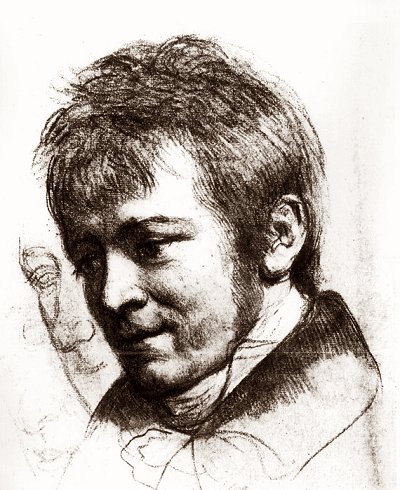
Heinrich von Kleist
(1777-1811)
Der höhere Friede
Wenn sich auf des Krieges Donnerwagen
Menschen waffnen, auf der Zwietracht Ruf,
Menschen, die im Busen Herzen tragen,
Herzen, die der Gott der Liebe schuf:
Denk´ich, können sie doch mir nichts rauben,
Nicht den Frieden, der sich selbst bewährt,
Nicht die Unschuld, nicht an Gott den Glauben,
Der dem Hasse wie dem Schrecken wehrt;
Nicht des Ahorns dunkelm Schatten wehren,
Daß er mich im Weizenfeld erquickt,
Und das Lied der Nachtigall nicht stören,
Die den stillen Busen mir entzückt.
Heinrich von Kleist poetry
fleursdumal.nl magazine
More in: Archive K-L, Heinrich von Kleist, Kleist, Heinrich von

Ei in mei
Na lang broeden op
slechts een paar woorden wordt een
haiku geboren.
Freda Kamphuis
(c)2012 Freda Kamphuis
kempis.nl poetry magazine
More in: Archive K-L, Kamphuis, Freda
![]()
Hartenklop
Naar elkaar bogen de lichamen zich
in de enigheid van de aanbidders
die ze waren, er was haar vrijmoedig-
heid en zijn weifelend verzet; ieder
moment met haar was een Hof van Eden
zilverspattend van een broosglanzend
licht, zij stichtte wanhoop in zijn geest, rede-
loos beliep hij zijn puinhopen, angsten
bestreed hij vergeefs, zo geschiedde dat
de kracht hem ontvlood haar te kozen, en
schonk een ander zijn apotheose, toch,
als hij haar ‘s nachts buiten bespiedt; mat
is zijn blik, te laat bevrijd vanbinnen
beslaat haar raam haar hartenklop.
Niels Landstra
Niels Landstra gedichten
kempis.nl poetry magazine
More in: Archive K-L, Landstra, Niels
![]()
Niemandsland
De honden renden op wolken van woorden
Over de ruïnes van een vergaan seizoen
Staken herfstige beken over, de zon gloorde
In kronen van roodkoper en najaarsgroen
Het wazige licht verstilde aan de overkant
Raakte aan de adem van de oude dieren
En de vallende schaduw in het niemandsland
Van bos en hei waar wij liepen, bij de grienden
Hield je mij vast, alsof je onze teleurgang
Vergeten was, en neigde naar een verzoening
Terwijl je wist dat uit mij geen troost meer voortkwam
De hondenas heb ik alleen uitgestrooid, lang-
zaam verdort hun grond in mijn lege niemandsland
Waar ik jou vergeefs nog aanklamp, bij de grienden
Niels Landstra
Niels Landstra gedichten
kempis.nl poetry magazine
More in: Archive K-L, Landstra, Niels
![]()
Ondergangsters
Haag van achterlampen
toeters die toeteren tot
vervelends toe, licht dat
desondanks hardnekkig rood
blijft, de wereld vergaat precies
hier en op dit moment.
Jehovah Getuige zet leren schoen
tussen portier van auto, die niet
tijdig dichtknalt, begint zalverig
praatje over Zijn God en de
Zijnen, te laat voor ons
de wereld vergaat
hier en nu
halleluja, ja de wereld vergaat.
Man in file voor stoplicht
pakt zijn pistool, schiet licht
kapot, stapt in auto, rijdt door
alleen hij blijft de ondergang voor.
Freda Kamphuis
(c)2011 Freda Kamphuis
kempis.nl poetry magazine
More in: Archive K-L, Kamphuis, Freda
![]()
Waterval
Je stille lippen, met een strootje
streel ik ze, loom
vaart je lazuren blik
mee op de bloesemrijke hemel
een lentecaleidoscoop
die ons verstart in climax
schepping, symbiose en ook
bezonkenheid, wij zijn
watervallen barend maanlicht
Het strootje in je witte mond
trilt in de schaduwvlekken
van illusoire wolken, de water-
val van toen is een kale rots
zinnen missen de woorden
het zwijgen stille deelneming.
Niels Landstra
Niels Landstra gedichten
kempis.nl poetry magazine
More in: Archive K-L, Landstra, Niels

Zebrale sacratie
Zich veilig wanende op zebra
oefende hij tegelijk yoga
wapperde met armen
als vogel
dacht niet aan nul procent bescherming
die gemiddelde zebra ons biedt.
Precies in het midden
deed hij moeilijkste oefening
kantelde
zijn hoofd richting straat
in omgekeerde staat
balanceert hij nog steeds daar.
Wonderbaarlijk genoeg
suist verkeer nu al twee dagen lang
rakelings langs
hoofdstaande man
hij drukt letterlijk weg, de weg
voor de duvel niet bang
in zijn eigen tijd
oogt hij
waarlijk bevrijd.
Freda Kamphuis
(c)2011 Freda Kamphuis
kempis.nl poetry magazine
More in: Archive K-L, Kamphuis, Freda
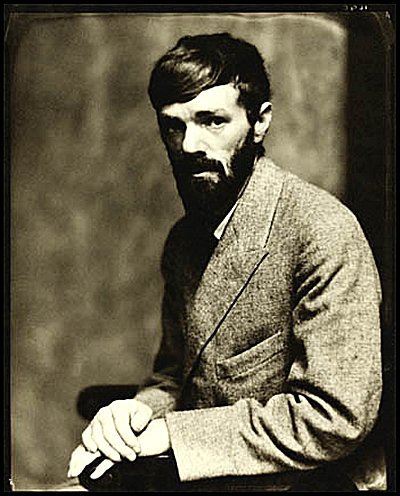
D. H. Lawrence
(1885-1930)
Snake
A snake came to my water-trough
On a hot, hot day, and I in pyjamas for the heat,
To drink there.
In the deep, strange-scented shade of the great dark carob-tree
I came down the steps with my pitcher
And must wait, must stand and wait, for there he was at the trough before
me.
He reached down from a fissure in the earth-wall in the gloom
And trailed his yellow-brown slackness soft-bellied down, over the edge of
the stone trough
And rested his throat upon the stone bottom,
i o And where the water had dripped from the tap, in a small clearness,
He sipped with his straight mouth,
Softly drank through his straight gums, into his slack long body,
Silently.
Someone was before me at my water-trough,
And I, like a second comer, waiting.
He lifted his head from his drinking, as cattle do,
And looked at me vaguely, as drinking cattle do,
And flickered his two-forked tongue from his lips, and mused a moment,
And stooped and drank a little more,
Being earth-brown, earth-golden from the burning bowels of the earth
On the day of Sicilian July, with Etna smoking.
The voice of my education said to me
He must be killed,
For in Sicily the black, black snakes are innocent, the gold are venomous.
And voices in me said, If you were a man
You would take a stick and break him now, and finish him off.
But must I confess how I liked him,
How glad I was he had come like a guest in quiet, to drink at my water-trough
And depart peaceful, pacified, and thankless,
Into the burning bowels of this earth?
Was it cowardice, that I dared not kill him?
Was it perversity, that I longed to talk to him?
Was it humility, to feel so honoured?
I felt so honoured.
And yet those voices:
If you were not afraid, you would kill him!
And truly I was afraid, I was most afraid, But even so, honoured still more
That he should seek my hospitality
From out the dark door of the secret earth.
He drank enough
And lifted his head, dreamily, as one who has drunken,
And flickered his tongue like a forked night on the air, so black,
Seeming to lick his lips,
And looked around like a god, unseeing, into the air,
And slowly turned his head,
And slowly, very slowly, as if thrice adream,
Proceeded to draw his slow length curving round
And climb again the broken bank of my wall-face.
And as he put his head into that dreadful hole,
And as he slowly drew up, snake-easing his shoulders, and entered farther,
A sort of horror, a sort of protest against his withdrawing into that horrid black hole,
Deliberately going into the blackness, and slowly drawing himself after,
Overcame me now his back was turned.
I looked round, I put down my pitcher,
I picked up a clumsy log
And threw it at the water-trough with a clatter.
I think it did not hit him,
But suddenly that part of him that was left behind convulsed in undignified haste.
Writhed like lightning, and was gone
Into the black hole, the earth-lipped fissure in the wall-front,
At which, in the intense still noon, I stared with fascination.
And immediately I regretted it.
I thought how paltry, how vulgar, what a mean act!
I despised myself and the voices of my accursed human education.
And I thought of the albatross
And I wished he would come back, my snake.
For he seemed to me again like a king,
Like a king in exile, uncrowned in the underworld,
Now due to be crowned again.
And so, I missed my chance with one of the lords
Of life.
And I have something to expiate:
A pettiness.
Taormina, 1923
D. H. Lawrence: Snake
fleursdumal.nl magazine
More in: Archive K-L, D.H. Lawrence, Lawrence, D.H.
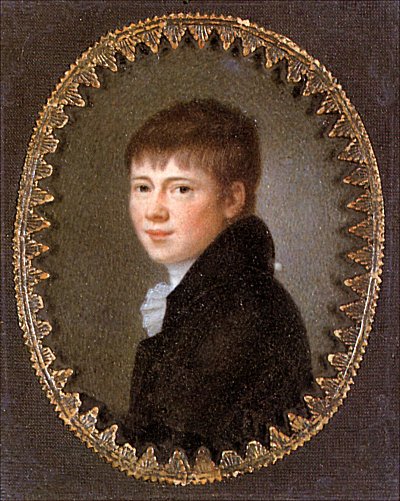
Heinrich von Kleist
(1777-1811)
Jünglingsklage
Winter, so weichst du,
Lieblicher Greis,
Der die Gefühle
Ruhigt zu Eis.
Nun unter Frühlings
Ueppigem Hauch
Schmelzen die Ströme –
Busen, du auch!
Heinrich von Kleist poetry
fleursdumal.nl magazine
More in: Archive K-L, Heinrich von Kleist, Kleist, Heinrich von
Thank you for reading Fleurs du Mal - magazine for art & literature